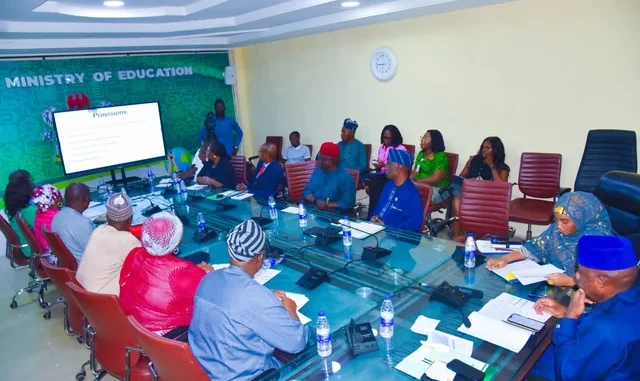
The Federal Government has inaugurated a comprehensive education reform initiative alongside the establishment of the Ministerial Project Approval Board (MPAB) to enhance accountability, transparency, and infrastructure development through Public–Private Partnerships (PPPs).
The inauguration, held at the Minister’s Conference Room, Federal Ministry of Education, marks a major step in the Tinubu administration’s effort to transform Nigeria’s education system and improve service delivery nationwide.
Speaking at the event, the Minister of Education, Dr. Maruf Tunji Alausa (CON), said the initiative aims to strengthen institutional efficiency while eliminating bureaucratic delays that hinder timely project execution. He explained that the MPAB’s framework aligns with President Bola Ahmed Tinubu’s directive introducing new approval thresholds for projects across Ministries, Departments, and Agencies (MDAs).
SPIRITUAL SOLUTION THAT WORKS
Are you in need of spiritual guidance about your life?
Do you need a complete spiritual check-up to balance your spiritual life, your Dreams and your spiritual suspicious?
Look no further!
Consult With Trusted A highly experienced spiritual guide.
DR ADAMS ADAM
Will Guide you to achieve Success, Wealth, Healing Possessions and protection, bręakthrough. Spiritual power, healing & cleansing, Peaceful relationship. Get our natural Male Enhancement to Improved your libido, sexual performance and Enhanced fertility. Our spiritual check-up program will reveal the hidden secrets about your Life and solution. For spiritual consultation and counseling.
ON MATTERS OF THE MIND, BODY AND SPIRIT.
Call or WatsApp + 2 3 4 7 0 6 2 1 5 6 8 3 4
With god All things
LOCATED AT “ABUJA, LAGOS, OSUN
Under the new policy, projects up to ₦20 billion fall within the MPAB’s approval authority, while those above ₦20 billion require Federal Executive Council (FEC) approval. For parastatals and agencies, projects between ₦10 billion and ₦20 billion will be approved by the supervising ministry’s PAB, while multi-agency projects, regardless of cost, will remain under FEC’s purview.
Dr. Alausa stated that the creation of the MPAB demonstrates the Ministry’s unwavering commitment to transparency, accountability, and value-driven governance. He urged board members to see their appointment as a national assignment aimed at delivering enduring transformation across the education sector.
“No single budget can solve all the challenges facing our education system,” the Minister said. “What we need is innovation, accountability, and collaboration. This new framework provides the structure to achieve that.”
He emphasized that the reforms would streamline procurement processes, promote PPPs, and clarify institutional roles, paving the way for efficient governance and improved learning environments.
The composition of the Ministerial Project Approval Board (MPAB) includes:
Honourable Minister of Education – Chairman
Honourable Minister of State for Education – Co-Chairman
Permanent Secretary – Member
Director, Special Duties – Member
Director, Legal Services – Member
Director, Procurement – Member
Director of the User Department (project-specific) – Member
A relevant nominee – Member
Deputy Director, Public–Private Partnership (PPP) – Secretary
In his remarks, Permanent Secretary, Mr. Abel Olamuyiwa Enitan, described the inauguration as a milestone in ensuring transparency and aligning with global best practices in project management. He noted that PPPs will be instrumental in expanding digital learning and addressing infrastructure deficits in schools nationwide.
Also speaking, Hajiya Binta Abdulkadir, Director of Senior Secondary Education, presented a PPP proposal for the Federal Government College, Kano, as one of the first projects to be evaluated under the new MPAB framework.
Dr. Alausa reaffirmed his confidence that, with continued presidential support and collaboration among stakeholders, the reforms will strengthen Nigeria’s education institutions, foster accountability, and transform schools into safe, inclusive, and globally competitive centres of learning.